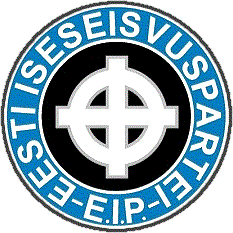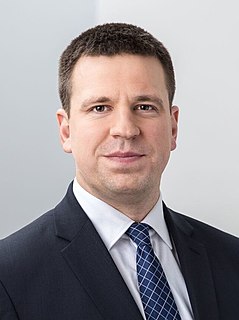Politics in Estonia takes place in a framework of a parliamentary representative democratic republic, whereby the Prime Minister of Estonia is the head of government, and of a multi-party system. Legislative power is vested in the Estonian parliament. Executive power is exercised by the government, which is led by the prime minister. The judiciary is independent of the executive and the legislature. Estonia is a member of United Nations, the European Union, and NATO.

The Republic of Estonia gained its independence from the Russian Empire on 24 February 1918 and established diplomatic relations with many countries via membership of the League of Nations. The forcible incorporation of Estonia into the Soviet Union in 1940 was not generally recognised by the international community and the Estonian diplomatic service continued to operate in some countries. Following the restoration of independence from the Soviet Union, Russia was one of the first nations to re-recognize Estonia's independence. Estonia's immediate priority after regaining its independence was the withdrawal of Russian forces from Estonian territory. In August 1994, this was completed. However, relations with Moscow have remained strained primarily because Russia decided not to ratify the border treaty it had signed with Estonia in 1999.

The Estonian Centre Party is a centre-left political party in Estonia. It was founded in 1991 as a direct successor of the Popular Front of Estonia, and it is currently led by Jüri Ratas.

The People's Union of Estonia was a political party in Estonia. Its last leader was Margo Miljand.

The Estonian Reform Party is a liberal political party in Estonia. The party has been led by Kaja Kallas since 2018. It is colloquially known as the "Squirrel Party".

.ee is the internet country code top-level domain (ccTLD) of Estonia, operated by the Estonian Internet Foundation.

Toomas Hendrik Ilves is an Estonian politician who served as the fourth president of Estonia from 2006 until 2016.

Mart Laar is an Estonian politician and historian. He served as the Prime Minister of Estonia from 1992 to 1994 and from 1999 to 2002. Laar is credited with having helped bring about Estonia's rapid economic development during the 1990s. He is a member of the centre-right Isamaa party.

The Estonian Independence Party is a far-right nationalist political party in Estonia. The party, founded in 1999, is a successor to the Estonian Future Party. One of the principal aims of the party is the withdrawal of Estonia from the European Union. The party is currently without parliamentary representation.

Jüri Ratas is an Estonian politician who was the 18th prime minister of Estonia from 2016 to 2021. He has been Leader of the Centre Party since 2016, and was the mayor of Tallinn from 2005 to 2007.

The Pirate Party is a political party in Sweden founded in 2006. Its sudden popularity has given rise to parties with the same name and similar goals in Europe and worldwide, forming the International Pirate Party movement.

The Finnish Anti-Fascist Committee, also known by its Finnish abbreviation SAFKA, is a radical political organisation operating in Finland, founded in November 2008, but never registered. According to the Chairperson Johan Bäckman the committee has twenty activists and about a hundred supporters.
Libertas Estonia was a political party in Estonia. It intended to contend the 2009 European Parliament elections under a common banner with Libertas.eu.

Pirate Party Australia is a political party in Australia that had traditionally represented civil liberty issues, but had also expanded into more traditional areas of policy. It was a Pirate Party which was based on the Pirate Party of Sweden, and continued to develop a comprehensive policy platform since its formation based on the Pirate ethos.

The Pirate Party of Canada was a minor party in federal Canadian politics. Founded in 2009, the party officially registered with Elections Canada in 2010. The PPCA is modelled on the Swedish Pirate Party and advocates intellectual property reform, privacy protection, network neutrality and greater government openness. No member of the party has been elected to Parliament. The party officially deregistered on November 30, 2017.

Pirate Parties International (PPI) is an international non-profit and non-governmental organization with headquarters in Brussels, Belgium. Formed in 2010, it serves as a worldwide organization for Pirate Parties, currently representing 39 members from 36 countries across Europe, Americas, Asia, Africa and Australasia. The Pirate Parties are political incarnations of the freedom of expression movement, trying to achieve their goals by the means of the established political system rather than just through activism. In 2017 PPI had been granted special consultative status to the United Nations Economic and Social Council.

Estonia, officially the Republic of Estonia, is a country in Northern Europe. It is bordered to the north by the Gulf of Finland across from Finland, to the west by the Baltic Sea across from Sweden, to the south by Latvia, and to the east by Lake Peipus and Russia. The territory of Estonia consists of the mainland, the larger islands of Saaremaa and Hiiumaa, and over 2,200 other islands and islets on the eastern coast of the Baltic Sea, covering a total area of 45,339 square kilometres (17,505 sq mi). The capital city Tallinn and Tartu are the two largest urban areas of the country. The Estonian language is the autochthonous and the official language of Estonia; it is the first language of the majority of its population, as well as the world's second most spoken Finnic language.

The Pirate Party Turkey is a political organization in Turkey based on the model of the Swedish Pirate Party. It was firstly founded by Serdar Kuzuloğlu and İsmail Hakkı Polat on August 26, 2009. After getting dissolved in 2010 due to infighting and disagreements, it got refound in 2013 by Serhat Koç, Barış Büyükakyol and Şevket Uyanık. The organization is inactive since 2015 and a reorganization attempt in 2017 got unsuccessful. The organization got a third refoundation on January 21, 2021, which is still in process of reorganizing the old supporters while trying to appeal to the new generation.

Kaja Kallas is an Estonian politician who has been serving as the prime minister of Estonia since 2021. The leader of the Reform Party since 2018, she has been a Member of Parliament since 2019, and previously between 2011 and 2014. Kallas served as a Member of the European Parliament between 2014 and 2018, representing the Alliance of Liberals and Democrats for Europe. Prior to her election to Parliament, she was an attorney specialising in European and Estonian competition law.

Märt Põder is an Estonian philosopher, freedom of information activist, presenter, publicist and translator.


















